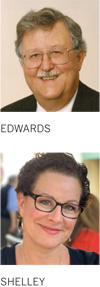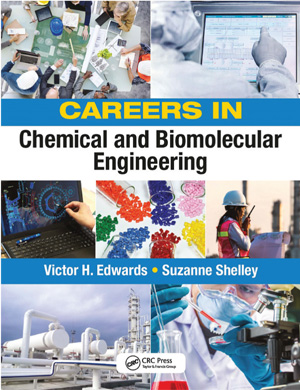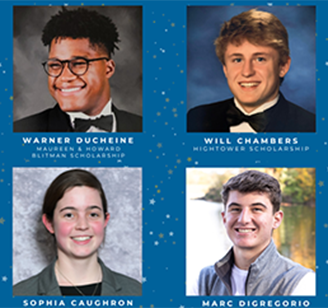September/October 2019
Communities: Education
Helping Students Realize They Can Be Heroes In Chemical Engineering
 If they think about chemical engineering at all, students may envision working at a chemical plant or a petroleum refinery. But the field offers a range of versatile career options. Chemical engineers are solving society’s big challenges. Along with biomolecular engineers, they’re developing clean energy, creating waste disposal solutions, improving food production, and producing life-saving medications.
If they think about chemical engineering at all, students may envision working at a chemical plant or a petroleum refinery. But the field offers a range of versatile career options. Chemical engineers are solving society’s big challenges. Along with biomolecular engineers, they’re developing clean energy, creating waste disposal solutions, improving food production, and producing life-saving medications.
That’s the message NSPE member Victor Edwards, P.E., and his coauthor Suzanne Shelley deliver with their book Careers in Chemical and Biomolecular Engineering. The book aims to show high school, college, and graduate students that they can be the heroes to help solve these critical issues.
The authors hope the book will also help those who are advising students about career options—such as high school teachers and guidance counselors.
 Edwards’ 50-year career in chemical engineering includes experience in process engineering, process safety management, and process and environmental technologies. He spent about 25 years working on projects for DuPont plants on the Gulf Coast; has authored more than 70 technical articles and several book chapters; and has garnered design and safety awards from DuPont, engineering companies, and the American Institute of Chemical Engineers.
Edwards’ 50-year career in chemical engineering includes experience in process engineering, process safety management, and process and environmental technologies. He spent about 25 years working on projects for DuPont plants on the Gulf Coast; has authored more than 70 technical articles and several book chapters; and has garnered design and safety awards from DuPont, engineering companies, and the American Institute of Chemical Engineers.
He first conceived of the book during a break in his consulting practice in the 1980s. But it wasn’t until about 35 years later, after he retired, that he finally had time to work on it. To do so, he teamed up with Shelley, a friend and an editor at Chemical Engineering magazine with whom he’d worked on articles over the years.
Their book highlights chemical engineering concepts, beginning from basics such as conservation of mass and energy, to help students “start in with an appreciation of the beauty of technology and engineering,” Edwards explains. But it goes beyond those topics in an attempt to shed light on what the profession is all about. As the PE describes, “what chemical engineers do for a living, where they work, how much they make, what sorts of things they can do besides traditional chemical engineering.”
As Shelley notes, there are plenty of books on chemical engineering principles for students who have already decided to pursue the field, but no other books about the profession itself. With varied opportunities, pay among the highest of the engineering disciplines, and low unemployment, chemical engineering has “a strong story to tell,” she says.
To humanize the topics and increase interest for younger readers, the authors included 25 profiles of individuals with backgrounds in chemical and biomolecular engineering. These first-person narratives provide answers to questions such as why the person chose their career, how they got into it, what they enjoyed or didn’t enjoy about their educational experience, what their career trajectory looked like, and what advice they’d give students.
Another key question they answer: What did you do when you didn’t love what you were doing? “The book is trying to tell young engineers, don’t despair over this, because the whole beauty of chemical engineering is that it’s so versatile,” explains Shelley. “For one part of your career you may be doing process engineering in a process plant and then later you’re doing marketing and product development. You might swing up to an executive level, you might go back down to a lab, you might go to a university setting, or you might end up in law.”
 The profiles also spotlight individuals of diverse backgrounds and ages to provide students with a range of relatable examples. And they include perspectives from women and minorities about their unique challenges.
The profiles also spotlight individuals of diverse backgrounds and ages to provide students with a range of relatable examples. And they include perspectives from women and minorities about their unique challenges.
Prairie View A&M University, a historically black university that’s part of the Texas A&M system, is now requiring the book for the freshman chemical engineering class.
When he was a high school student, Edwards’ father, then a principal piping designer for Union Carbide, advised him to become a chemical engineer. Initially, Edwards had trouble grasping what one did. Now, after a distinguished half-century in the field, the NSPE member is helping other young people understand the career paths they can pursue to make a difference.


 Volunteering at NSPE is a great opportunity to grow your professional network and connect with other leaders in the field.
Volunteering at NSPE is a great opportunity to grow your professional network and connect with other leaders in the field. The National Society of Professional Engineers (NSPE) encourages you to explore the resources to cast your vote on election day:
The National Society of Professional Engineers (NSPE) encourages you to explore the resources to cast your vote on election day:



